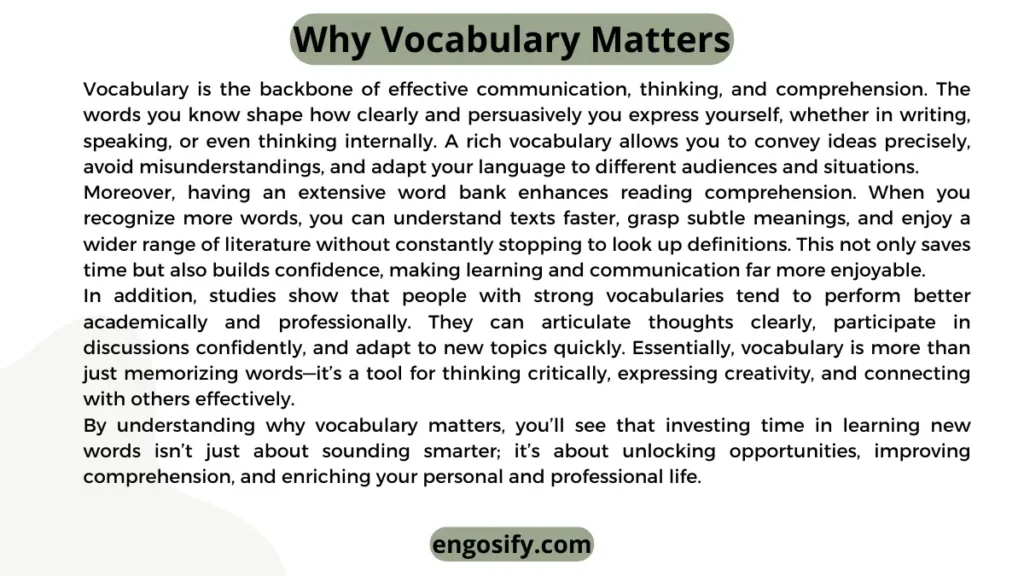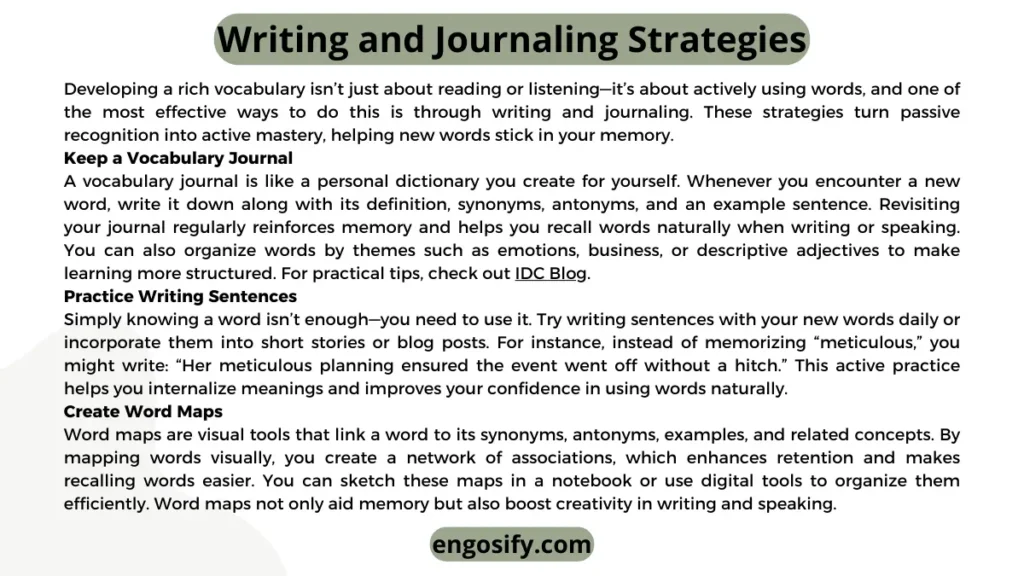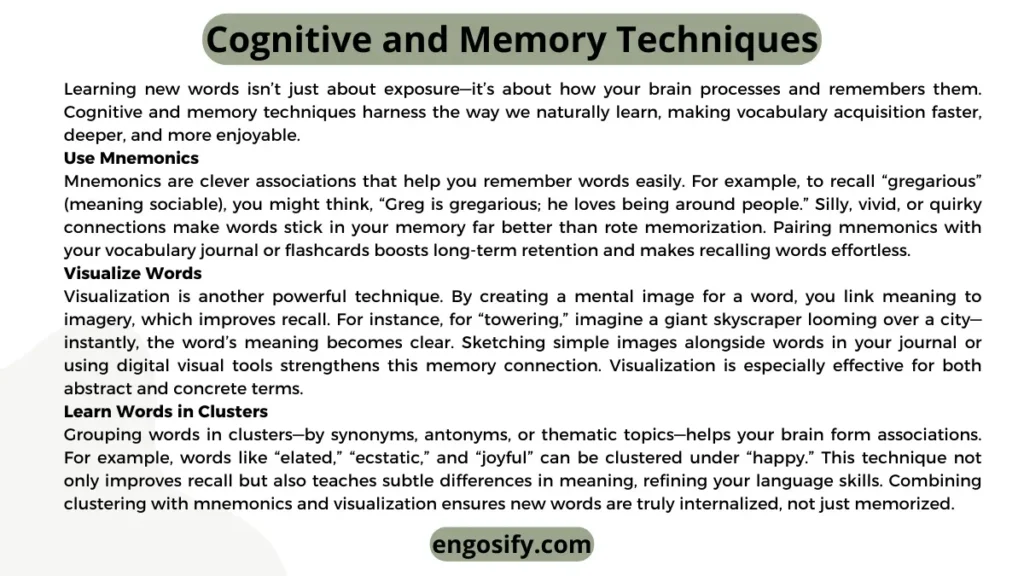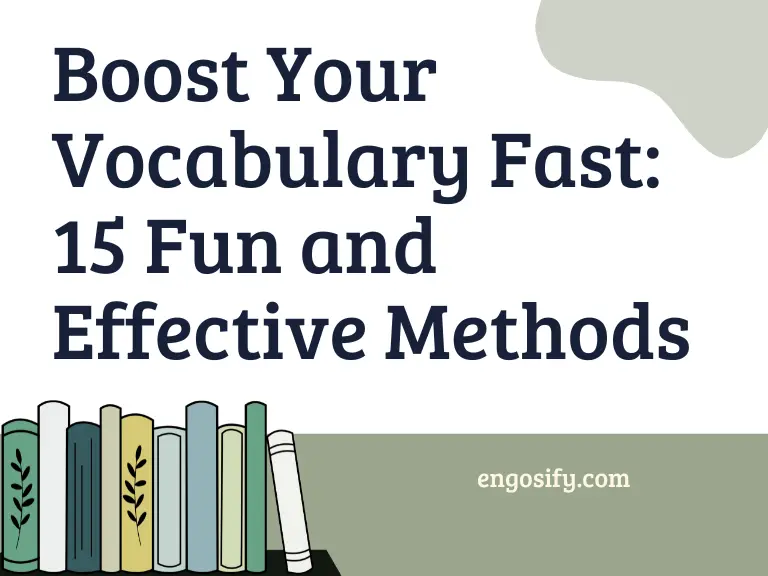Expanding your vocabulary doesn’t have to feel like a boring chore. In fact, it can be exciting, engaging, and even a little fun! Whether you’re a student trying to ace exams, a professional aiming to communicate more effectively, or simply a language lover looking to flex your lexical muscles, boosting your word bank can open countless doors. In this article, we’re diving into 15 fun and effective methods to supercharge your vocabulary fast. You’ll discover creative reading strategies, playful games, memory hacks, and tech-savvy tools—all designed to make learning new words not just easy, but enjoyable too.
Introduction
Why Vocabulary Matters
Ever stumbled mid-sentence because the right word just wouldn’t pop into your head? Well, that’s where a strong vocabulary swoops in to save the day. A robust lexicon not only makes you sound smarter but also boosts your confidence in both writing and speaking. From crafting compelling essays to acing interviews or simply chatting with friends, having the right words at your fingertips can make a huge difference.
Moreover, studies show that people with rich vocabularies tend to comprehend reading material faster and remember information better. In short, words aren’t just for sounding smart—they’re essential tools for thinking clearly, expressing yourself, and connecting with others.
The Challenge of Vocabulary Building
Here’s the catch: learning new words can feel overwhelming, especially with so many to memorize and even more ways to use them. It’s easy to forget a word the moment you look it up. But don’t fret! By using strategies that mix fun, context, and repetition, you can learn words faster without feeling like you’re stuck in a never-ending list of flashcards.
Overview of the Article
This article breaks down 15 methods to boost your vocabulary fast into practical, easy-to-follow strategies. You’ll explore reading tricks, writing exercises, playful games, memory techniques, and even tech tools. Along the way, you’ll discover ways to make learning natural, engaging, and—dare we say it—addictive! For instance, reading extensively, using contextual learning, and even playing word games can turn your vocabulary journey into a daily adventure. Plus, we’ll sprinkle in insights from trusted resources like Oxford Learning to guide you further.

Reading-Based Techniques
Read Extensively
One of the most powerful ways to boost your vocabulary fast is simply to read—a lot, and widely. But here’s the trick: don’t just stick to one type of material. Mix it up! Dive into newspapers, novels, blogs, scientific articles, or even online forums. Every genre introduces you to new words, idioms, and expressions. For example, reading fiction exposes you to creative language and nuanced emotional expressions, while non-fiction can teach specialized terminology and precise vocabulary.
The key is to read with intention. Instead of just skimming, notice unfamiliar words, underline them, and see how they’re used in context. This makes remembering them far easier than rote memorization. Tools like Newsela provide leveled reading materials specifically designed to expand your vocabulary while keeping reading fun and engaging.
Contextual Learning
Have you ever guessed the meaning of a word just by the sentence around it? That’s contextual learning, and it’s a game-changer. Rather than memorizing a list of words with definitions, try to learn words in context. Pay attention to how words interact with others in sentences and paragraphs. For instance, the word “meticulous” may feel tricky, but when you read “She arranged the flowers in a meticulous pattern,” the meaning becomes clear without opening a dictionary.
Contextual learning also encourages you to see words as living tools you can use naturally. To practice, try writing your own sentences with new words or even creating small stories. This reinforces memory and helps you use the words confidently in real life.
Use a Dictionary and Thesaurus
Even though reading and context do wonders, a good old-fashioned dictionary and thesaurus are invaluable. Not only do they give you the precise meaning of a word, but they also expose you to synonyms, antonyms, and related words, expanding your lexical range effortlessly. For example, looking up “happy” might introduce you to “ecstatic,” “content,” or “cheerful”—each with subtle nuances.
Make it a habit to check words you encounter while reading, jot down their meanings, and try to weave them into your daily conversations. Online resources like Oxford Learning provide practical tips for integrating dictionaries and thesauruses into everyday learning, making this process both effective and enjoyable.
Writing and Journaling Strategies
Keep a Vocabulary Journal
Here’s a simple yet super effective trick: start a vocabulary journal. Whenever you stumble upon a new word, jot it down along with its meaning, a sentence example, and even a synonym or antonym. This isn’t just about writing words; it’s about creating a personal reference that you can revisit and revise regularly. Over time, your journal becomes a treasure trove of words to use in daily conversation, writing, or even exams.
To make it even more engaging, try categorizing words by theme—like “emotions,” “business terms,” or “fun adjectives.” This small habit significantly reinforces memory and ensures that the words don’t slip away as soon as you learn them. Check out tips from IDC Blog for practical examples on keeping an effective vocabulary journal.
Practice Writing Sentences
Learning words in isolation is only half the battle. To really boost your vocabulary fast, you need to use the words in sentences. Try crafting daily sentences with your new words, or even better, weave them into a short story or blog post. This method forces your brain to actively recall words, enhancing retention and helping you internalize their correct usage.
For example, if your new word is “meticulous,” instead of just memorizing it, write: “Her meticulous attention to detail made the project flawless.” See how naturally it fits? Using words actively is far more effective than passive memorization.
Create Word Maps
Word maps, also called semantic maps, are visual tools that help you connect related words and ideas. Start with a central word and branch out with synonyms, antonyms, examples, and even idiomatic expressions. This visual association strengthens memory and gives your brain a network of connections rather than isolated vocabulary nodes.
Apps and online tools can help you build digital word maps, but even a paper notebook works wonders. Word maps not only improve memory but also spark creativity when you’re writing or speaking, giving you a wider palette of words to choose from.

Engaging Games and Activities
Play Word Games
Who says learning vocabulary can’t be fun? Word games are a fantastic way to boost your vocabulary fast while keeping your brain sharp. Games like Scrabble, Boggle, and crosswords challenge you to think creatively, recall words quickly, and even discover new ones. Even mobile apps that focus on word puzzles can make learning addictive and interactive.
These games don’t just improve memory—they enhance spelling, word association, and quick thinking. Plus, when you compete with friends or family, learning becomes social and motivating. The key is consistency; playing a little every day makes a surprising difference over time. For tips on fun ways to incorporate games into your learning, check out Oxford Learning.
Use Flashcards
Flashcards are a classic for a reason—they work! Digital or physical, flashcards allow you to actively recall words and their meanings, which strengthens memory far more than passive reading. Write the word on one side and its definition, synonyms, or an example sentence on the other. For extra challenge, mix them up and test yourself in random order.
Apps like Anki or Quizlet make this even easier by using spaced repetition, ensuring you review words just before you’re likely to forget them. This technique accelerates retention and helps you internalize new vocabulary quickly.
Participate in Word Challenges
Word challenges, whether online or offline, add a dash of excitement to vocabulary building. Daily or weekly challenges—like learning five new words a day and using them in conversation—push you to apply new vocabulary actively. You can also join online forums or social media groups dedicated to language learning for friendly competitions.
The beauty of challenges is that they turn learning into a game, keep you accountable, and provide instant motivation. Over time, these small, consistent efforts compound into a noticeable improvement in your vocabulary.
Multimedia Learning
Watch Movies and TV Shows
Learning new words doesn’t have to stay confined to books and journals—multimedia can be a game-changer. Watching movies and TV shows exposes you to everyday language, slang, idioms, and pronunciation in a natural context. For instance, a sitcom might teach you casual expressions, while a documentary introduces precise and technical vocabulary.
To make this method even more effective, try watching with subtitles. Pause when you hear a new word, jot it down in your vocabulary journal, and later practice using it in sentences. Over time, this combination of listening and observing helps your brain absorb words organically and strengthens comprehension. Platforms like IDC Blog highlight how media immersion can accelerate learning for visual and auditory learners alike.
Listen to Podcasts
Podcasts are another treasure trove for vocabulary enhancement. They cover countless topics, from history and science to business and self-improvement. Listening regularly helps you pick up not only new words but also proper usage, tone, and context.
For maximum benefit, select podcasts that challenge you slightly above your current level. Pause and replay sentences with unfamiliar words, and jot them down to revisit later. This active engagement makes vocabulary retention far more effective than passive listening.
Use Language Learning Apps
Apps are a modern and highly effective tool for rapid vocabulary growth. Many apps combine gamification, spaced repetition, and multimedia content to reinforce learning. For example, apps like Memrise, Duolingo, or Quizlet let you practice new words daily through quizzes, flashcards, and interactive exercises.
The biggest advantage? These apps track your progress, remind you to review tricky words, and let you learn anywhere, anytime. Incorporating apps into your routine ensures that vocabulary building becomes a seamless part of your day rather than a chore.
Cognitive and Memory Techniques
Use Mnemonics
Want to boost your vocabulary fast without feeling like you’re cramming? Mnemonics are your secret weapon. By creating clever associations, you can link unfamiliar words to something you already know, making them far easier to recall. For instance, to remember “gregarious” (meaning sociable), you might think, “Greg is gregarious; he loves being around people.” Silly, quirky, or vivid associations stick in your mind like glue, helping you recall words instantly during writing or conversation.
Research shows that mnemonic techniques are especially effective for long-term retention, turning abstract words into memorable mental images. Pairing this with your vocabulary journal or flashcards amplifies the effect.

Visualize Words
Visualization takes mnemonics a step further. By creating a mental picture of a word, you link meaning to imagery, which significantly improves memory retention. For example, for the word “towering,” imagine a giant skyscraper looming over a city—this visual instantly cements the word’s meaning.
Even better, try sketching simple pictures alongside new words in your journal or using apps that allow visual word mapping. When your brain can “see” a word, it’s much more likely to recall it quickly when needed. This technique works brilliantly for both abstract and concrete terms.
Learn Words in Clusters
Another effective strategy is to learn words in clusters. Group related words together—synonyms, antonyms, or topic-based clusters. For example, cluster words like “elated,” “ecstatic,” and “joyful” under “happy.” This method allows your brain to form associations, making it easier to retrieve related words in conversation or writing.
Learning in clusters also helps you understand subtle differences in meaning between similar words, refining your vocabulary and making your language more precise. Combined with mnemonics and visualization, this method ensures that new words are not only memorized but truly internalized.
FAQs
7.1 How Can I Learn New Words Quickly?
Learning words quickly doesn’t mean rushing through lists. The key is active engagement. Read extensively, write new words in a vocabulary journal, and practice using them in sentences. Combining reading with multimedia—like podcasts and TV shows—helps reinforce memory naturally. Daily practice, even just 10–15 minutes, creates a rhythm that accelerates learning. For additional strategies, Oxford Learning offers practical tips to enhance word retention effectively.
7.2 What Are the Best Apps for Vocabulary Building?
Modern apps make vocabulary expansion easier and fun. Tools like Memrise, Duolingo, and Quizlet use spaced repetition, gamified exercises, and quizzes to help you memorize words efficiently. Podcasts and YouTube channels designed for language learners are also excellent supplements. Combining apps with active reading and writing ensures your learning is balanced and comprehensive. Check out IDC Blog for recommended app-based methods.
7.3 How Often Should I Practice to See Improvement?
Consistency is king. Aim for short, daily practice sessions rather than infrequent long marathons. Even 15–20 minutes a day, if consistent, can boost your vocabulary fast. Mix reading, writing, games, and apps to reinforce new words through multiple channels, making them stick for the long term. Word challenges and flashcards also provide motivation and structure, ensuring you steadily expand your lexical toolkit.
Conclusion
Building a strong vocabulary doesn’t have to be dull or overwhelming. By combining reading, writing, games, multimedia, and cognitive strategies, you can boost your vocabulary fast while having fun along the way. Whether it’s keeping a journal, visualizing words, playing word games, or using apps, each method reinforces learning in its own unique way. Remember, consistency and active engagement are key—practicing a little every day leads to remarkable improvement over time. With these 15 methods at your disposal, expanding your word bank becomes an exciting journey rather than a chore, helping you communicate more confidently, think more clearly, and enjoy the power of language to its fullest.

